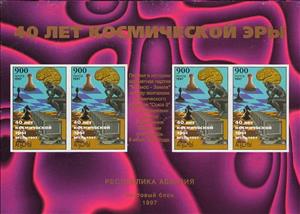Souvenir Sheet: 40th Anniversary of a Space Exploration (Abkhazia 1997)
40th Anniversary of a Space Exploration (Abkhazia 1997)
22 December (Abkhazia ) within release Space Exploration, 40th Anniversary goes into circulation Souvenir Sheet 40th Anniversary of a Space Exploration face value 4*900 Russian ruble
| Souvenir Sheet 40th Anniversary of a Space Exploration in catalogues | |
|---|---|
| Michel: | Mi: AB BL17 |
Souvenir Sheet is horizontal format.
Stamp number in Catalog of Republic of Abkhazia: BL.18Also in the issue Space Exploration, 40th Anniversary:
- Stamp - 40th Anniversary of a Space Exploration face value 900;
- Souvenir Sheet - 40th Anniversary of a Space Exploration face value 4*900;
Souvenir Sheet 40th Anniversary of a Space Exploration it reflects the thematic directions:
An anniversary is the date on which an event took place or an institution was founded in a previous year, and may also refer to the commemoration or celebration of that event. For example, the first event is the initial occurrence or, if planned, the inaugural of the event. One year later would be the first anniversary of that event. The word was first used for Catholic feasts to commemorate saints. Most countries celebrate national anniversaries, typically called national days. These could be the date of independence of the nation or the adoption of a new constitution or form of government. The important dates in a sitting monarch's reign may also be commemorated, an event often referred to as a "Jubilee".
Chess is usually played by two players (called chess players) against each other. It is also possible for one group of chess players to play against another or against one player; such games are often called consultation games. In addition, there is the practice of simultaneous play sessions, when several opponents play against one strong player, each on a separate board.
The rules of the game were basically developed by the 15th century; In modern official tournaments, the rules of the International Chess Federation[6] are applied, which regulate not only the movement of pieces, but also the rights of the judge, the rules of behavior of players and time control. A game played remotely - for example, by correspondence, by telephone or via the Internet - has special rules. There are many variants of chess that differ from classical ones: with non-standard rules, pieces, board sizes, etc. The corresponding section of chess composition is fairy chess. Some aspects of the game of chess are studied in mathematics (for example, the classic “Knight's Move Problem” and “Eight Queens Problem”), including through computer simulation. Chess is usually played by two players (called chess players) against each other. It is also possible for one group of chess players to play against another or against one player; such games are often called consultation games. In addition, there is the practice of simultaneous play sessions, when several opponents play against one strong player, each on a separate board.
The rules of the game were basically developed by the 15th century; In modern official tournaments, the rules of the International Chess Federation[6] are applied, which regulate not only the movement of pieces, but also the rights of the judge, the rules of behavior of players and time control. A game played remotely - for example, by correspondence, by telephone or via the Internet - has special rules. There are many variants of chess that differ from classical ones: with non-standard rules, pieces, board sizes, etc. The corresponding section of chess composition is fairy chess. Some aspects of the game of chess are studied in mathematics (for example, the classic “Knight's Move Problem” and “Eight Queens Problem”), including through computer simulation.


